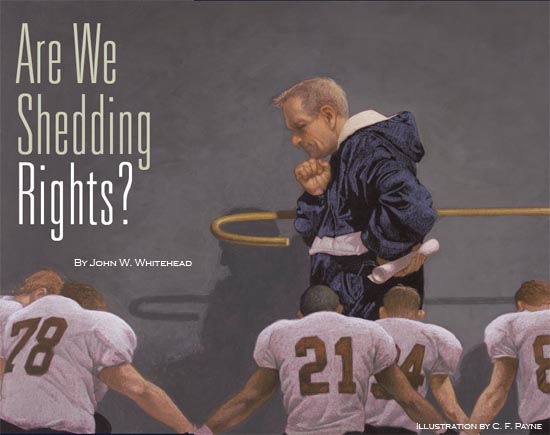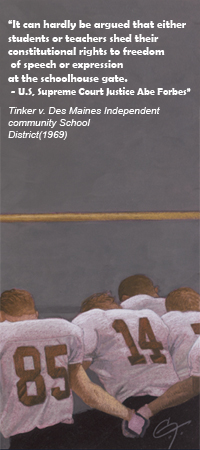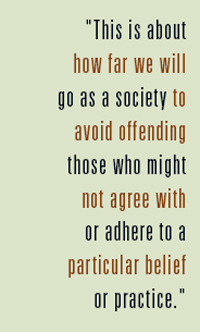Are We Shedding Rights?
John W. Whitehead September/October 2008
Marcus Borden epitomizes what it means to serve as a role model for young people. Indeed, in recognition of his positive influence on his players, school, and community, the prestigious American Football Coaches Association awarded Borden its 2004 Power of Influence Award.
In 2003 Borden was honored as USA Weekendmagazine's "Most Caring Coach" for his efforts in creating the Home News Tribune Snapple Bowl, which raises money for the Lakeview School for Cerebral Palsy and Children's Specialized Hospital. In the bowl all-star players from neigh-boring counties compete against one another in a night of football and fund-raising. Marcus Borden also organizes rallies at the two children's facilities with young patients there, the all-star players, and cheerleaders. Then during the actual bowl, each player plays for a specific child. According to Borden, it's "what the game is really all about. I'm a firm believer that you should be able to give something back to the community."
Incredibly, despite Marcus Borden's distinguished career and awards (he has also been inducted into the New Jersey Scholastic Coaches Association Hall of Fame and honored with the New Jersey Gatorade Coaches Care Award), the New Jersey ACLU legal director insists that he has fostered a "destructive environment" for students.
What did Borden, who for more than 25 years has served as head coach at East Brunswick High School in New Jersey, do to create such a "destructive" environment? He bowed his head— silently . Sometimes he knelt down on one knee— silently . Coach Borden wasn't attempting to pray with his football players, nor was he leading them in prayer. He was showing silent respect by bowing his head while his players offer their pre-game prayers, a longstanding tradition. Consequently, Borden found himself threatened with termination. Yet, as a student athletic trainer who worked with Borden during his first year as a coach at East Brunswick remarked, "The tradition of student-initiated prayer goes back many, many years. I think with all that is wrong in our schools today—gun violence, bullying, promiscuity, etc.—that the energy being spent on Marcus Borden bowing his head and taking a knee is a waste. Here is a man trying to support the youth in his care and be a positive role model and all these administrative yahoos can worry about is his presence in a room with his players while they pray. It is time people stopped obsessing over the positive messages a coach is trying to send and start worrying about the real problems in school today."
Many of America's public schools are in a deplorable state, and our young people are surrounded by dangers on all sides—from premarital sex, school shootings, and drug and alcohol abuse to low literacy standards and a lack of understanding about the difference between right and wrong. Consider a recent study, for example, which found that nearly 26 percent (1 in 4) of American teenage girls ages 14-19 have at least one sexually transmitted disease.

Pregame, student-led prayer has been a regular part of football for many years. In fact, East Brunswick High's practice of player-initiated, pregame prayer has been in effect for more than 25 years, with more than 2,000 former East Brunswick football players opting to voluntarily pray before taking the field on game days. The prayers are a simple, solemn, nonsectarian request for safety and honor on the field: "Dear Lord, please guide us today in our quest in our game. Please let us represent our families and our communities well. Lastly, please guide our players and opponents so that they can come out of this game unscathed, no one is hurt."
But after some parents reportedly complained about a prayer that was offered at a pre-game pasta dinner, the practice became a target for official school censure. Quick to jump on the "thou-shalt-not-offend" bandwagon, school officials passed a policy in October 2005 prohibiting representatives of the school district from participating in student-initiated prayer.
School officials went so far as to order Borden, who also teaches Spanish, to stand still rather than bending a knee and silently bowing his head while his players recited pregame prayers. The penalty for disobeying was disciplinary action, including the loss of his job as a coach and tenured teacher. School officials justified their actions by insisting that while student athletes have the constitutionally protected right to pray, that privilege does not extend to coaches, who are public employees and whose participation would violate the First Amendment establishment clause, or the "separation of church and state" provision in the Bill of Rights.
Borden responded by offering his resignation in protest. But after thinking further about the matter, he changed his mind and rescinded his resignation so he could continue coaching. At the same time, believing that he was taking "a stand for every high school football coach in America," Borden, with the help of The Rutherford Institute, also filed a lawsuit asking the courts to review the school's prayer policy.

Although Borden prevailed at the district court level, the school appealed the ruling, aided by Americans United for Separation of Church and State. And in April 2008, the U.S. Court of Appeals for the Third Circuit overturned Cavanaugh's decision. The court ruled that a football coach may not silently bow their head or "take a knee" with their team as gestures of respect for student-led prayers prior to a game. The appeals court specifically held that Borden's silent gestures are not activities protected by the First Amendment. The court also ruled that a teacher's in-class speech is not constitutionally protected and the educational institution, not the individual teacher, has the final determination of how to teach the students. Finally, the court declared that Borden's silent gestures violated the First Amendment establishment clause.
Understandably, Borden's case is being closely watched by athletic directors across the country who have been instructed to cease pray-ing with their players. According to Grant Teaff, executive director of the American Football Coaches Association, more than 50 percent of high school football coaches nationwide have engaged in team prayer.
However, this case could impact more than just coaches. If this ruling is allowed to stand, it could very well mean that high school teachers across the United States will have virtually no free speech or academic freedom rights since, as the appeals court reasoned, teachers are mere proxies of the school hierarchy.
Yet this case is not really about whether a coach can silently bow their head out of respect during their players' pre-game prayers. This is about how far we will go as a society to avoid offending those who might not agree with or adhere to a particular belief or practice. In other words, we have become a politically correct society, where diversity is increasingly treated as an anathema and uniformity is prized. If someone might be offended, freedom of speech is erased. And when religious expression is involved, the establishment clause is sometimes used as a bludgeon to stamp out even silent gestures, such as Coach Borden's.
We must remember that those who added the establishment clause to the Constitution were primarily concerned with state practices that would interfere with an individual's freedom of religion. That is why the establishment clause is balanced in the First Amendment with the free exercise clause, which allows for freedom of religious expression—something the state (including the public schools) should not be able to eradicate.
Those who gave us the United States Constitution understood very well that civil and religious liberty generally go hand in hand. The suppression of either one, for any length of time, will terminate the existence of the other. As historian Roland Bainton has observed: "All freedoms hang together. Civil liberties scarcely thrive when religious liberties are disregarded, and the reverse is equally true. Beneath them all is a philosophy of liberty which assumes a mea-sure of variety in human behavior, honors integrity, respects the dignity of man, and seeks to exemplify the compassion of God."
As our society becomes increasingly secularized, we would do well to remember that just as all freedoms hang together, they fall together as well.
Constitutional attorney and author John w. whitehead is founder and president of The Rutherford institute, Charlottesville, Virginia.
Article Author: John W. Whitehead
John W. Whitehead, founder and president of the Rutherford Foundation, writes from Charlottesville, Virginia.